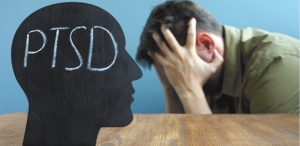

If you survived hospitalization with COVID, suddenly lost a loved one to the virus, or perhaps worked as a first-responder or healthcare worker during the two-year ordeal, moving on might not be so simple.
In the aftermath of COVID-19, those directly exposed to and affected are now reporting PTSD-like symptoms, says, Dr. Richard Capiola, a Psychiatrist practicing in Naples.
Posttraumatic Stress Disorder or PTSD develops following the direct or indirect exposure to death, threatened death, or actual/threatened serious injury. Exposure to COVID-19 absolutely constitutes as a traumatic event, but it’s the symptoms that occur as a result, how much the symptoms interfere with functioning, and for how long that helps us understand if it’s PTSD, Dr. Capiola adds.
PTSD vs. Stress:
PTSD is different from stress, which has also surged during the pandemic. The initial uncertainty of COVID – what it was, how it spread – unsurprisingly caused stress and anxiety for the majority. The social and political aspects of minimizing the effects of the virus (quarantine, masks, vaccines) further compounded the stress. As we slowly emerged from the pandemic, however, the stress likely settled, too.
PTSD vs. Grief:
There was a lot of loss as a result of the COVID-19 pandemic – notably the loss of life – and also of our livelihoods, like job security, housing and food, and even community. Grief following loss is normal and feelings of sadness, anger or detachment may last several weeks. But, while immediate grief can look very similar to PTSD in terms of symptoms, they are different, says Dr. Capiola. Namely, he adds, in PTSD “the symptoms persist for at least a month and overwhelm people to the point they seek treatment.”
PTSD:
Could you have PTSD as a result of the COVID-19 pandemic? Symptoms may include:
• Recurrent and upsetting memories or nightmares about your experiences with COVID
• Attempts to distract or avoid thoughts and feelings related to COVID or avoiding people and places that remind you of it
• New and exaggerated negative beliefs about yourself or the safety of world
• Persistent negative emotional state (fear, guilt)
• New and marked feelings of depression
• Feeling detached or estranged from other people
• Feeling irritable or having unexplained angry outbursts
• Being overly alert of dangers, especially of safety and health
Stress, Grief, and PTSD Treatment:
If you’re still feeling stressed or prolonged grief as a result of the pandemic, mental health treatment can help you process and problem-solve. A benefit of the pandemic is the emergence of tele-health. Take advantage of online or tele-mental individual or groups counseling. Consult the Centers for Disease Control and Prevention for COVID-19 mental help resources and hotlines. CDC – Coping During the Pandemic
If you are experiencing symptoms of PTSD as the result of COVID-19, it is vital to seek mental health treatment as soon as possible. Psychotherapy, including Cognitive Behavioral Therapy (CBT), Cognitive Processing Therapy (CPT), and Prolonged Exposure are well-researched PTSD treatments that, if started quickly, can be effective. Medication options, like antidepressants and sleep aids can be simultaneously helpful.
With triple board certification in general psychiatry, addiction psychiatry and forensic psychiatry, Dr. Richard J. Capiola has been in practice for 27 years. During his training at Tulane Medical School and UCLA, Dr. Capiola developed a keen interest in the treatment of depression and anxiety overlapping with drug and alcohol abuse. This focus led to his role as chief medical officer for Oglethorpe Inc., which specializes in the treatment of mental health and addiction. He has been instrumental in the clinical development and oversight of 12 specialty treatment centers in five states.
Dr. J Richard Capiola, MD
Dr. Capiola’s specialties include adult and adolescent psychiatry, treatment of anxiety, depression, and substance use problems, and forensic psychiatry, where he evaluates patients with legal issues related to mental health.
Dr. Capiola is the chief of psychiatry for Physicians Regional Medical Center and was the medical director for the Wilough at Naples for many years. He’s served 10 years with The Joint Commission, which evaluates hospitals nationwide for quality of care and safety.
Dr. Capiola was the featured neuropsychiatrist in the recent book “Don’t Give Up On Me” with Darryl Strawberry. His confidential private practice focuses on using each individual’s inherent strengths to achieve the goal of living a healthy, well-balanced life.
Dr. J Richard Capiola, MD
239.649.7494
704 Goodlette Frank Road North, Suite 222
Naples, Florida 34102
 Southwest Florida's Health and Wellness Magazine Health and Wellness Articles
Southwest Florida's Health and Wellness Magazine Health and Wellness Articles

